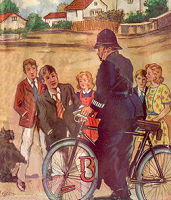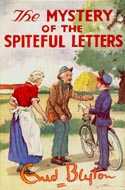
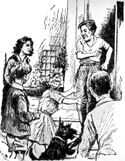
The Five Find-Outers and Dog are together again!
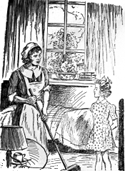
Bets notices that Gladys is upset about something.
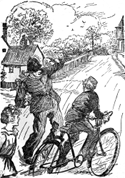
The "telegraph boy" nearly runs Mr Goon down!
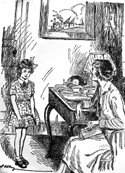
Bets tries to get Mrs Moon's address from her mother by sending a small parcel.
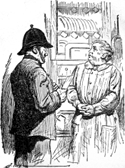
Mr Goon finally loses his temper with Mrs Moon.
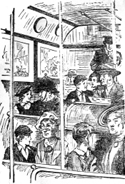
The Five Find-Outers get the bus to Sheepsale and question all the passengers—much to Mr Goon's dismay!
The Mystery of the Spiteful Letters
Review by Keith Robinson (January 12, 2005)
The fourth mystery is a little disappointing in the end. It starts off well, with Fatty disguising himself as a red-headed telegragh boy who "accidentally" lets his bike fall on Mr Goon's shins while he delivers a telegram to the others saying that Fatty has gone to solve a mystery in Tippylooloo (somewhere in China). The telegraph boy is very apologetic and polite, and Mr Goon actually likes him: "There's a boy that's civil and respectful to the law," he says as the boy cycles away. Later in the book Fatty dons the same red wig and pretends he's a butcher boy, and later still a parcel delivery boy. I enjoyed the whole red-headed boy thing, and Mr Goon's confusion as each disappears into thin air without a trace (the last from a box room where the befuddled policeman locks him up). But all this fun doesn't make a good mystery.
Someone is sending "nonnimus" spiteful letters to certain others in Peterswood. The adults confide in Mr Goon and everything is kept quiet so the kids can't "interfere"...but the Find-Outers are soon on the trail. The first big step is getting hold of the letters, which they do with the help of Gladys, the slightly feeble-minded housemaid, who naughtily nabs them from Mr Goon's possession. The Find-Outers note that the letters are post-marked 11.45am on Mondays from Sheepsale, a nearby town. From this the gang deduce that the letter-writer must get the 10.15am bus from Peterswood to Sheepsale every Monday morning. Hmm, really? There are no collections on Sunday so actually the writer could have posted the letters anytime after the last Saturday collection. Now, if there was an additional collection earlier on Monday mornings, say at 8am, then it would logically make sense that the letters had to be posted after 8am for collection at 11.45am, thereby holding together the Find-Outers' logic...but Blyton makes no mention of any earlier collections so the logic doesn't really work. And just because the spiteful letters are written only to people in Peterswood, suggesting intimate knowledge of the villagers, doesn't necessarily prove the culprit actually lives there, and has to take a bus every Monday morning. Did people not have cars in 1946, when this was written? I'm sure some people did!
Naturally it turns out Fatty and the gang were right in their wild assumptions, but I think Blyton could have strengthened the reasoning a little.
The trip to Sheepsale was fun, although the bus ride was a little odd. There were five passengers on the bus and each Find-Outer chooses one to sit next to and question. Hmm. If I were a passenger, I'd be mightily suspicious if five kids got on and split up, sitting next to other passengers instead of choosing empty seats.
The characters are the usual Blyton-style bunch: a hopeless maid called Gladys and her slightly terse sharp-nosed aunt; Old Nosie, who lives in a caravan; Mrs Jolly, who owns a sweet shop; two nameless bus passengers, one a sour-faced man and the other a nice artist girl; the return of Miss Trimble from Disappearing Cat; Mrs Cockles, who cleans for the Hiltons as well as Mr Goon (we also meet Mrs Cockles' sister Mrs Lamb); Miss Tittle, a spiteful dressmaker; and Mrs Moon, the Hilton's bad-tempered cook.
I won't give away who the culprit turns out to be, but like other mysteries it's no great surprise. What's great about previous mysteries like Burnt Cottage and Disappearing Cat is that, although we know who did the crimes, we don't know how. In Spiteful Letters I guessed who the culprit was but was disappointed by the resolution; there's a really convenient bag of clues that Mr Goon finds under a bush by the river and, assuming they were planted there by Fatty, he dumps the bag in the Find-Outers' laps. Fatty immediately knows who did it—as do the readers, because it's pretty obvious by this point. In fact, it's almost annoying that none of the other Find-Outers can figure it out. When Fatty does his presentation in front of Mr Goon and Inspector Jenks I was almost expecting some other revelation, something I wasn't expecting...but no, it's just a run-through of what is already blindingly obvious. Admittedly I'm more than twenty years older than the intended age group, but still it's a little weak. And there's no real motive either, other than the culprit being a spiteful person. And why exactly does the culprit leave the bag of clues under a bush by the river? That makes no sense.
Oh well. I have mixed feelings about this book. It has fun parts as Fatty rushes about all over the place in disguise, but the mystery itself seems a little feeble in my opinion.
The Mystery of the Spiteful Letters
Review by Heather from Australia (January 27, 2005)The Mystery of the Spiteful Letters is to me probably the third-weakest story in the series (behind Banshee Towers at a firm number one, followed by Tally-Ho Cottage, which I found quite boring). I found the book a little less enthralling than the others and had no trouble at all putting it down during my first reading.
Given that, the book still has some interesting points. The concept of anonymous letters has not been recycled from or copied in any other Blyton book as far as I am aware, which makes the mystery a little unique. However the discovery of the final clue (Goon thrusting the real clue on Fatty) was also repeated in The Mystery of the Strange Bundle. I also found it just a little too convenient that Goon just happened to stumble upon the clue without any forethought. As was the Inspector's sudden appearance at Pip's house just as Fatty was about to reveal all to Pip's mother. This would have broken the Find-Outer series rule that they have to rub it in the face of Goon by always having Inspector Jenks present when the mystery is revealed.
Fatty's gallavanting about as various red-headed boys is the most endearing part of the story. His constant polite insolence always appeals to me, and I loved his "Please don't report me, sir, I'm that sorry" after while disguised he almost knocked Goon over on purpose. He again used his newspaper trick to escape from the room he was locked in, which prompts me to mention Mr Goon's "long routine telephone call which he made every day about this time", allowing Fatty ample time to escape. I thought that was more than a little thin and badly orchestrated.
I did find it a little strange that there was no mention at all of Luke from Disappearing Cat when the children went to interview Miss Tremble. They saw Miss Harmer, and I was expecting Luke at least to pop his head around the corner of the house and grin at the children. I think it would have been nice for such a wonderful character to make another appearance, if only for a paragraph.
I thought Fatty showed amazing ingenuity when he thought of dressing up as a delivery boy in order to obtain handwriting samples, however the mystery was otherwise just a little too lucky. From Bets overhearing conversations and Gladys slipping the letters to Fatty to Fatty answering Pip's telephone, the sudden appearance of the clues and Inspector Jenks' presence at Pip's house—it is all just a little too contrived for my liking.


